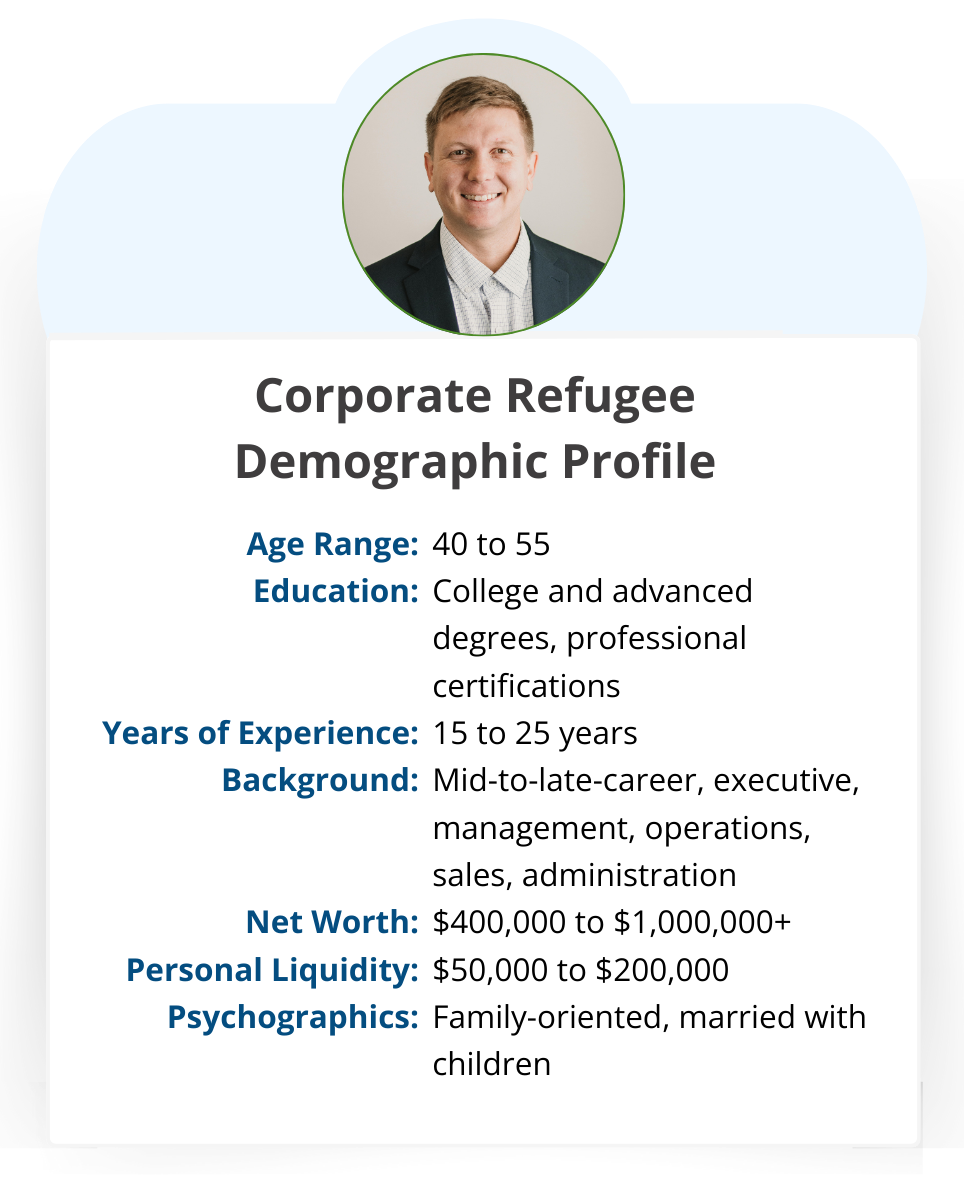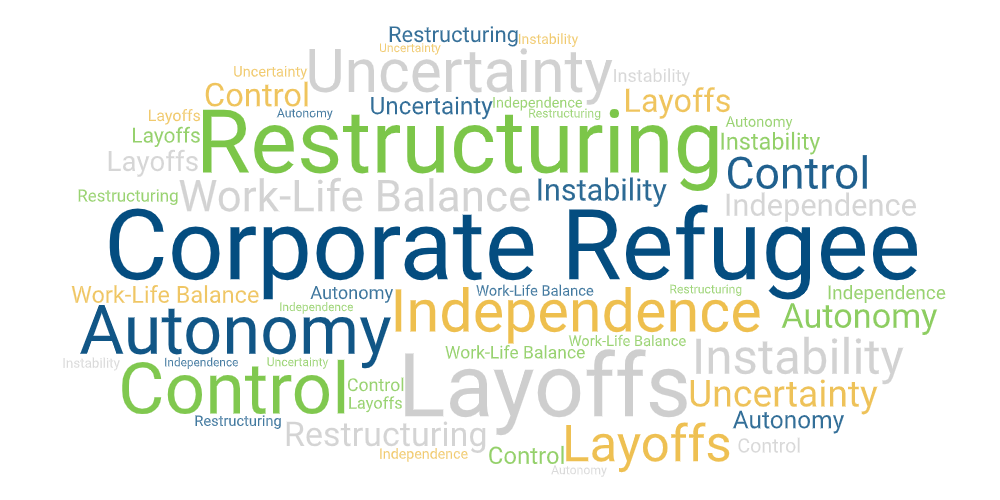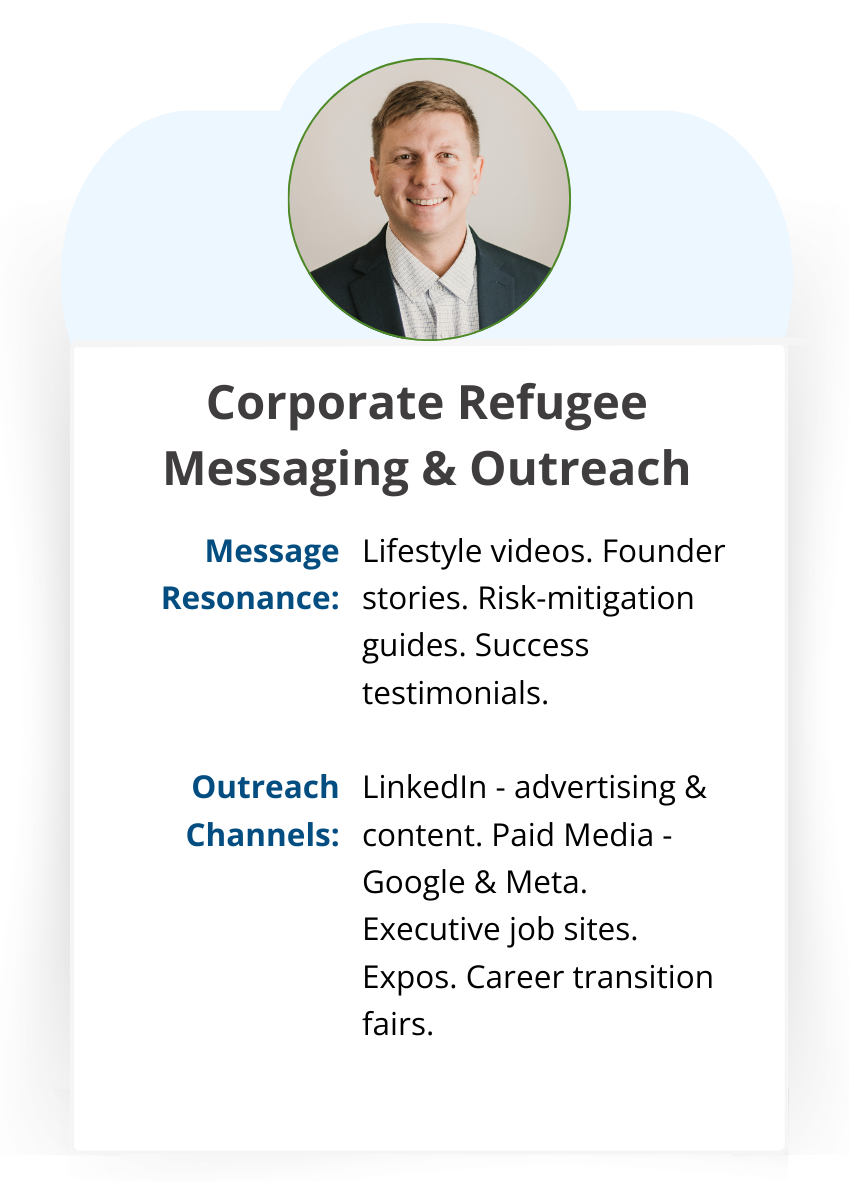Franchise Buyer Persona Profile: The Corporate Refugee
This article marks the first installment in a comprehensive series that examines the 15 franchise buyer personas shaping today’s franchise landscape. Each persona represents a distinct segment of candidates—defined by their backgrounds, motivations, and decision-making behaviors—that franchise brands must recognize to successfully attract, engage, and support the right owners for their system.
In this initial piece, we take a deep dive into the corporate refugee, also known as the second-career franchise buyer. Upcoming articles in this series will continue to explore the full spectrum of franchise buyer personas, offering insights and actionable guidance for franchisors and marketers looking to build stronger, more targeted franchise development strategies.
The Corporate Refuge or Second-Career Franchise Buyer
As the landscape of career transitions continues to evolve, a growing number of professionals are finding new purpose and financial opportunity by moving from established corporate roles into franchise ownership. These individuals—often labeled as “corporate refugees” or “second-career franchise buyers”—bring decades of executive experience, strong financial acumen, and a desire for both autonomy and community to their search for the right business venture. Understanding who they are, what motivates them, and what hurdles they face is key for franchisors hoping to attract and support this valuable demographic in today’s marketplace.
Here we will explore the defining characteristics, motivations, pain points, and franchise preferences of the corporate refugee. We’ll examine how these buyers evaluate investment timelines, what they seek in a franchise system, and why financial readiness and methodical research are vital to their process. Equally important, we dive into the biggest challenges these franchisees encounter when transitioning from structured corporate environments to full-spectrum business ownership.
Finally, we’ll cover actionable marketing strategies and messaging insights for connecting with and converting this sought-after buyer persona. From the power of peer testimonials and educational resources to the importance of targeted digital campaigns and networking opportunities, each section provides practical guidance for engaging the corporate refugee on their path to franchise success.
What is the Demographic Profile of the Corporate Refugee?
The Corporate Refugee or Second-Career Franchise Buyer Persona represents a distinctive demographic transitioning from established corporate roles to franchise ownership, often motivated by a desire for greater autonomy and a balanced lifestyle. Typically, these individuals range in age from 40 to 55, though this can extend as young as the mid-30s or as mature as the early 60s.
Their educational background is robust, with most holding college or university degrees, frequently in disciplines such as business, management, or engineering. It is also common for many within this group to possess advanced degrees or professional certifications relevant to their prior corporate careers.
Professionally, these individuals have occupied mid- to senior-level positions within corporate environments, including roles like managers, directors, executives, or specialists. Their fields of expertise generally encompass:
Operations
Sales
Marketing
Finance
Administration
These candidates generally bring 15 to 25 years of experience in corporate settings before opting to pursue franchise ownership.
Financially, the corporate refugee is well-capitalized. Their net worth typically lies between $400,000 and $1 million, with personal liquidity ranging from $50,000 to $200,000. This capital often originates from a combination of savings, severance packages, home equity, or personal investments.
Unlike many startup entrepreneurs, this group rarely depends solely on external financing such as loans. While some may utilize SBA loans or other financing vehicles, the predominant funding source is personal assets. This financial readiness enables them to self-fund both the franchise acquisition fees and the initial operating expenses.
Psychographically, these individuals are family-oriented, usually married with children, and prioritize finding a business opportunity that supports a sustainable work-life balance.
Geographically, they tend to reside in urban or suburban areas that provide convenient access to franchise markets and corporate headquarters, with a preference for regions densely populated with major employers.
What Motivates the Corporate Refugee to Buy a Franchise?
Motivations play a pivotal role in defining the corporate refugee/second-career franchise buyer persona. Their motivations shape both the appeal of franchising and the specific pathways these individuals choose in pursuit of career reinvention.
Autonomy and control over career direction consistently emerge as top motivators. After years in structured organizations, these individuals seek to “control their own destiny,” escaping the confines, uncertainty, and cultural mismatches of corporate life.
Many have also experienced or fear layoffs, restructuring, or ongoing corporate instability. This fear influences their strong drive to find meaningful, sustainable work outside traditional employment channels.
While financial stability after years in the corporate sector is a motivator, equally important is the quest for fulfillment and personal impact. For this persona, the prospect of building an enterprise with observable impact holds particular appeal. They seek to find opportunities where compensation aligns with effort, and bureaucracy is minimized
Franchising offers distinct advantages that these individuals want as they compare franchising to starting a business from scratch. Proven systems, transparent business models, robust support networks, mentorship opportunities, peer camaraderie, and an established brand collectively lower the perceived risk involved in entrepreneurship and are all valuable to individuals in this persona.
Lifestyle flexibility is another common driver. Many in this group are interested in models that allow for work-life balance, semi-absentee ownership, or direct involvement in family-friendly businesses. The transition to franchising is underscored by the desire to reclaim time previously lost to the demands and unpredictability of corporate roles. Ownership enables them to apply existing leadership, management, and operational skills in a new context—leveraging years of expertise while gaining the satisfaction of business ownership.
Finally, the direct correlation between effort and financial outcome, as opposed to the fixed nature of corporate salaries, is another motivating factor underlying the appeal of franchise ownership for this persona.
What Kind of Franchises Draw Corporate Refugees?
Corporate refugees and second-career franchise buyers are particularly discerning in the types of franchise opportunities they pursue, with preferences shaped by their backgrounds, priorities, and risk profiles.
Established brands with strong reputations, well-documented operating systems, and robust support infrastructure are highly attractive to this persona, providing reassurance and a clear blueprint for success. Sectors preferred often include those with predictable cash flows and brand recognition, such as:
Home services
Cleaning
Restoration
Mobile or service-based businesses
Individuals who fall within this persona are attracted to franchise brands where management structures are flexible and overhead is relatively low. This group increasingly favors lean, service-based franchises over bricks-and-mortar investments, with a preference for franchises that minimize staffing, equipment, and inventory needs.
A sense of community and opportunities for mentorship are also major draws, as these buyers value networking with peers and being part of a franchise system that fosters shared learning and support.
Many are drawn to semi-absentee or executive models. These models align with their strengths in leadership and operations while offering the potential for lifestyle balance and ongoing professional growth, rather than demanding hands-on, day-to-day management.
Increasingly, corporate refugees are entering franchising as multi-unit owners. This reflects a CEO mindset—building teams, focusing on operational growth, and maximizing returns through diversification, rather than simply replacing a job with a single business.
For many, franchising is not just a career shift, but part of a broader portfolio strategy. These individuals often seek opportunities for diversification, leveraging their financial and managerial acumen by acquiring regional or exclusive development rights, and sometimes complementing franchise investments with other small business or investment interests.
How Quickly Do Corporate Refugees Commit?
Timeline decisions are a crucial part of the franchise selection process for corporate refugee franchise buyers, often extending over a period of four to twelve months. This range is influenced by several factors, including:
Capital readiness
The depth of family involvement in the decision
The extent of research and due diligence conducted
For those adjusting after a recent layoff or carefully comparing multiple franchise concepts, timelines trend toward the longer end of the spectrum, as added considerations and caution further lengthen the process.
This deliberate, multi-stage approach reflects the persona’s methodical evaluation style, risk awareness, and desire for alignment between their investment and long-term professional and personal goals.
What Pain Points Do Corporate Refugees Face as Franchise Owners?
Transitioning from a structured corporate environment to franchise ownership introduces a range of unique pain points for the corporate refugee, despite the extensive advantages franchising offers.
One of the most significant hurdles is adapting from clearly defined responsibilities to the multifaceted demands of business ownership, where the former executive is suddenly accountable for every aspect—sales, marketing, operations, and customer acquisition alike. This shift requires embracing radical accountability; unlike the corporate world, all successes and failures rest solely on their own decisions.
Financial anxieties also persist throughout this transition. Although job security concerns may have triggered the move from corporate life, business ownership introduces its own set of risks, notably the fear of financial losses. Many are apprehensive about losing personal capital, especially when the stakes involve substantial portions of their savings or severance packages.
For many who fall in this persona, it’s a common misconception that the franchise fee covers all needed investment. They may overlook ongoing costs, such as royalties, rent, payroll, and inventory, or these expenses may be higher and more persistent than anticipated. The road to profitability may be long, and the lack of a guaranteed salary can be particularly stressful for those supporting families or nearing retirement age.
The abrupt loss of a built-in peer network compounds these challenges. Former corporate leaders accustomed to strong organizational structures and immediate access to colleagues can experience feelings of isolation as they build new support systems from scratch in the franchise world.
Uncertainties around personal capability, fluctuating markets, and brand longevity further amplify doubts. The franchise model mitigates some risks, but it is not risk-free—franchisees must still navigate business volatility and the reality that not every system guarantees profitability or long-term sustainability.
These pain points highlight the critical need for resilience, realistic expectations, and a willingness to build new peer and mentorship networks. Recognizing and preparing for these challenges is essential for long-term success and satisfaction as a franchise owner.
How to Market To and Attract the Corporate Refugee
Effective marketing to the corporate refugee/second-career franchise buyer persona hinges on developing tailored messages and outreach strategies that speak directly to this group’s unique background, priorities, and pain points.
Content that resonates most includes detailed success stories and video testimonials from other former executives who have successfully transitioned into franchise ownership. This content should highlight the real-world benefits, improved lifestyle, and tangible results these buyers seek.
Educational guides that demonstrate how to leverage corporate skills in franchise management, and clear, data-driven comparisons between franchise models, help bridge the gap between professional experience and franchise opportunity.
Messaging should emphasize the robust support infrastructure of franchise systems, including:
Comprehensive training
Peer networking opportunities
Mentorship within a collaborative franchisee community
Transparent information on risk mitigation, operational requirements, costs, and return on investment is also essential for engendering trust and addressing this persona’s naturally analytical mindset.
Inspirational “day in the life” videos, founder stories, and practical transition resources further reinforce the attainable benefits of franchise ownership for corporate professionals in search of purpose and independence.
Marketing and outreach strategies should focus on targeted digital advertising across:
LinkedIn, both advertising and content
Paid Media, including Google and Meta Ads
Executive-level job boards
Professional networking groups
This will ensure messaging is visible where mid-to-late career professionals search for opportunities.
To establish credibility and trust, turn to in-person engagement at franchise expos, executive networking events, and career transition fairs. Specialized webinars and seminars addressing common pain points are also effective.
Solutions to overcome the doubts individuals in this persona face should include:
Peer networking events (like webinars and discovery days)
Robust testimonials
Direct access to accomplished multi-unit operators who have made the leap from corporate to franchise ownership
Thought leadership content and financial education resources—especially those targeted through segmented and persona-specific digital campaigns—further position franchisors as credible, supportive partners in career change.
Ultimately, successful brands build trust by delivering transparent, educational, and inspirational stories across digital and in-person channels, enabling corporate refugees to envision a secure, impactful, and rewarding future in franchise ownership.
What’s Up Next?
This article kicked off an in-depth exploration into the diverse franchise buyer personas shaping today's franchise landscape, with the Corporate Refugee serving as a prime example of professionals making bold career pivots from corporate environments into franchise ownership. By understanding the motivations, challenges, and preferences unique to this group, franchisors and marketers can better support their journey and maximize recruitment success.
Stay tuned for the next installment of our franchise buyer profile series: The ROI-Driven Buyer. This upcoming article will dive into the mindset, goals, and strategies of buyers who build multi-location and/or multi-brand franchise empires, offering further actionable insights for anyone seeking long-term growth and scalability within a franchise system.




